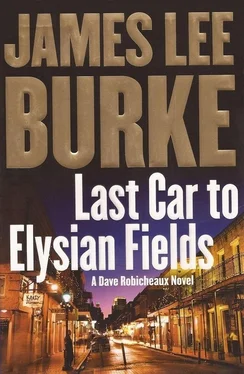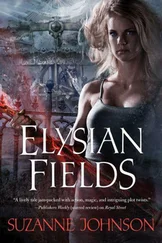“I think you need counseling, my friend.”
“Sir, you’re a prelate and hence I believe a man of honor. Can you give me your word you won’t continue to interfere in certain enterprises that are fully legitimate and doing little if any harm to anyone?”
Father Jimmie shuffled some papers around on his desk, then picked up a page torn off a note pad. “Your name is Max Coll?” he said.
“The coppers must have paid you a visit.”
“Are you on Canal or St. Charles?”
There was a pause, then Max Coll said, “Now, how would you be knowing where I am?”
“There’s only one streetcar line in operation today. It runs only on those two streets. So that means you’re not too far away from me.”
“You’re a mighty intelligent man. But I need to.”
“You stay out of my church.”
“Sir?”
“You heard me. If you ever bring a weapon into my confessional again, I’ll tear you apart.”
“Excuse me for saying this, Father, but that is a fucking mean-spirited statement for a Christian minister to make.”
“Be thankful I don’t have my hands on you,” Father Jimmie said, and hung up.
Then he stood motionlessly by his desk, his heart hammering against his chest.
That same evening, Leon Hebert, the daiquiri-store operator who had fired Josh Comeaux, had to handle the window by himself because Josh’s replacement had called in sick. Hebert didn’t like to work alone, at least not at night. He was a cautious man, both with money and people, and had made his living over the years on the soiled edges of society wherever he had gone. If there was any group of people he understood in this world, it was his clientele.
After he was discharged from the United States Navy, he had owned a liquor store on South Central Avenue in Los Angeles. The profits were huge and, except for the insurance, the overhead minimal. He accepted food stamps, welfare grocery orders, and even Bureau of Public Assistance bus tokens in place of money. After 2:00 A.M. he and a hired man would drive a panel truck down to East Fifth Street and sell eighty-nine-cent bottles of fortified wine, called short dogs, for two dollars apiece to the desperate souls who could not wait for the bars to open at 6:00 A.M.
But Leon Hebert learned there was a downside to running a business in a ghetto. On a warm summer night a white L.A. patrolman tried to hook up a drunk driver and force him into the back of a cruiser. In five minutes bricks, bottles, and chunks of curb stone were being flung into the traffic on Century Boulevard. This was in the era before the Crips and Bloods, but their predecessors the Gladiators, Choppers, Eastside Purple Hearts, Clanton 14, and the Aranas rose to the occasion and strung fires all over the south and east sides of Los Angeles.
A Molotov cocktail crashed through the window bars and front glass of Leon Hebert’s store. The inventory went up like gasoline.
In the riot only two groups of white-owned businesses were spared: funeral homes and the offices of bail bondsmen. The lesson was not lost on Leon. When he got back to New Iberia, his birthplace, he sold burial insurance to people of color, collecting their half-dollar and seventy-five-cent premiums weekly, wending his way without fear through every back-of-town slum in south Louisiana.
Then he discovered the fast lane to prosperity was still available. He didn’t have to go into the ghetto to sell his wares, either. The ghetto dwellers came to him, inside a shady grove on the four-lane, their gas-guzzlers smoking at his drive-by window, his ice-packed daiquiris, sweet and cold, ready to go at five bucks a pop.
He should have felt good about his situation, he told himself. He’d saved every cent he’d made peddling burial insurance and put it in a surefire franchise that gave him 60 percent of the profits. He made people happy, didn’t he? Why did these damn kids from Loreauville get themselves killed with his cups in their car? And how about Josh Comeaux telling the physician, what was his name, Dr. Parks, teenagers were always served at Leon’s drive-by?
Mondays were slow and Leon thought about closing up early. What was it that was bothering him? The doctor? The sheriff’s detective who got in his face? He looked out the service window into the dusk and saw blue-collar families leaving a barbecue-and-po’boy place on the corner of the short span of asphalt that joined the east-bound and westbound highways, between which he operated his store. The evening was warm and fireflies floated in the oak trees. He watched the people from the barbecue place getting into their cars and pickups, their children bouncing up and down on the seats. For just a moment he wanted to join them and free himself from whatever presence it was that seemed to cling to his skin like road film.
Three spoiled brats from Loreauville run themselves off the road into a telephone pole and he’s in the toilet. There was no justice, he told himself.
A junker car filled with black men pulled to the window and Leon removed six plastic-sealed daiquiris from the ice compartment of his giant refrigerator and handed them one by one through the driver’s window.
Leon waited for the car to pull away, but it didn’t. The driver continued to stare into Leon’s face, a toothpick in the corner of his mouth. A passenger in the backseat was smoking a cigarette, the ash glowing in the darkness. The passenger by the right front window held a metallic object in his lap, one that glinted dully in the light from the dashboard.
“I’m not alone. I got a man here with me,” Leon said, his pulse quickening.
“What you talking ‘bout, man?” the driver said.
The passenger by the right front window lifted a Zippo from his lap and lit a cigarette with it.
Leon let out his breath. “Y’all want something else?” he said.
“Yeah, you ain’t give me my change,” the driver said.
Three hours later Leon Hebert put his money bag in the floor safe, locked the doors, and turned off the lights. It was a beautiful night.
The wind rustled in the trees overhead and the constellations were stenciled across the sky. An eighteen-wheeler passed on the highway, then an ambulance with its flashers on. The ambulance continued on past the hospital and turned onto the drawbridge and the state highway that fed into Loreauville Road, where the three girls had been trapped inside their burning Buick.
Why did he have to think in images like that? He didn’t do it, he told himself. That kid who worked for him, Josh Comeaux, had a boner in his pants for the Parks girl and would have let her slam it in the car door if she’d wanted to. Why didn’t they put that in the paper? he said to himself.
No justice, he thought.
Someone started a pickup truck in front of the barbecue place and backed out of the parking lot, then headed slowly down the asphalt strip toward Leon Hebert’s store, pieces of gravel clicking under the tires.
Leon fished his car keys out of his pocket, then dropped them in the darkness. When he bent over to retrieve them, the driver of the pickup turned into the oyster-shell loop that curved past Leon’s drive-by service window.
“We’re closed,” Leon said, the high beams of the pickup burning red circles into his eyes.
But there was no response from inside the truck.
“Who is that?” he said, trying to smile.
A figure opened the truck door and stepped out on the oyster shells.
Leon raised his hand to shield his eyes and squinted into the brilliance of the headlights. “My clerk already went to the bank. There’s nothing here for you,” he said.
The first pistol shot hit him high up on the chest with an impact like an anvil iron, knocking him backward, the hard-packed oyster shells slamming into the back of his head. The shooter had cut the lights on the pickup and was walking toward him, stooping for just a second to pick an object off the ground. The shooter stared down at Leon, perhaps realizing a mistake had been made, that the wrong person had been shot, that Leon Hebert should not have had a fate like this imposed upon him.
Читать дальше












